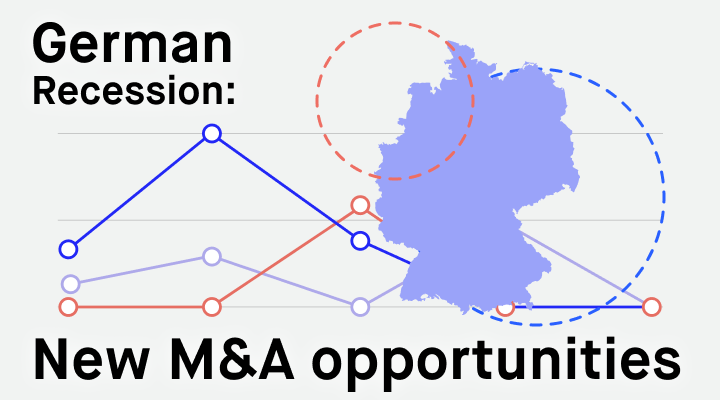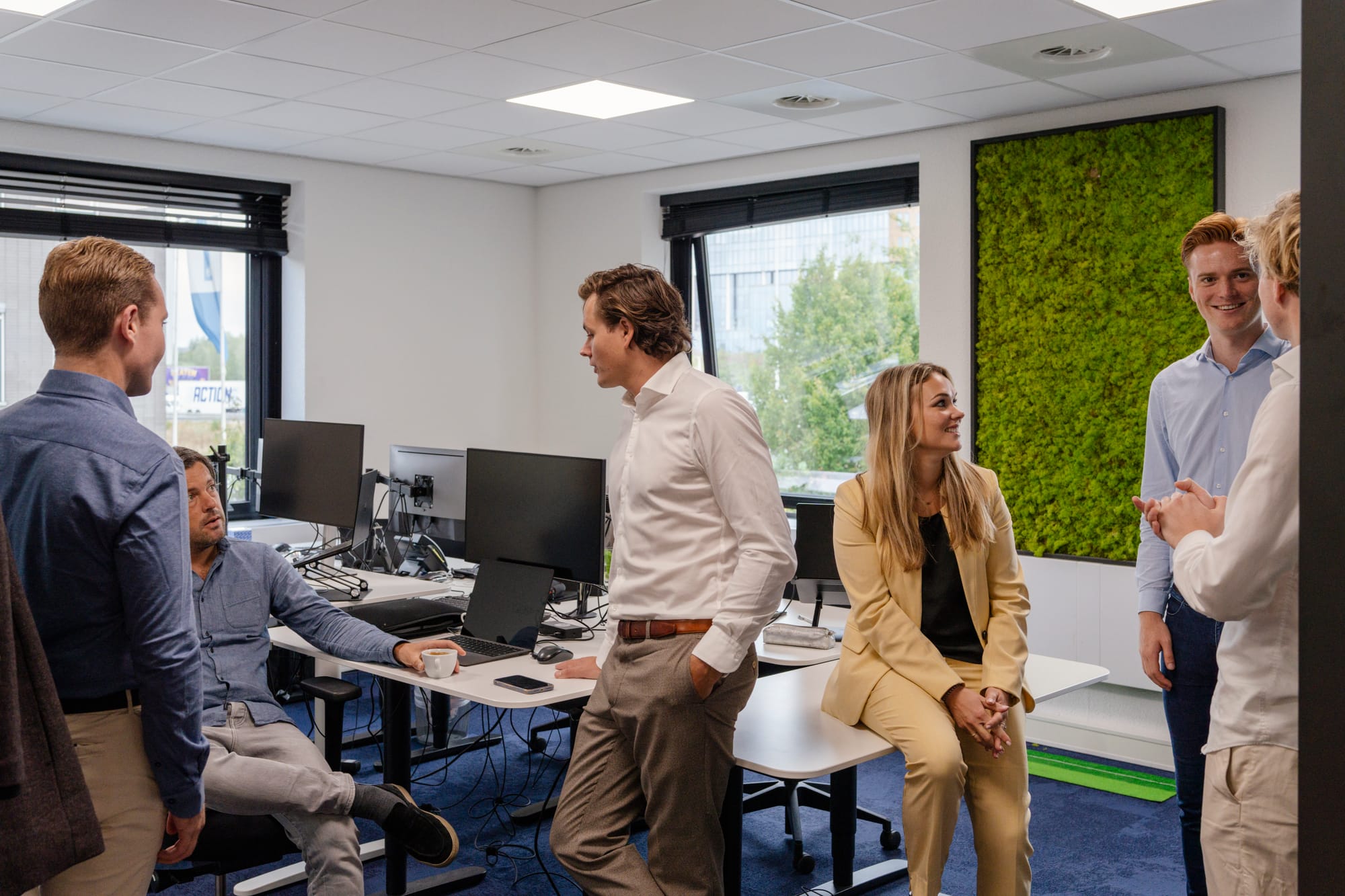Germany's Economic Landscape and M&A Opportunities: Navigating the Current Climate
Germany's downturn uncovers M&A prospects. Explore strategic insights and SME resilience, with Virtual Vaults enhancing deal security.

The German Economy: A Brief Overview
Germany, long recognized as Europe's economic powerhouse, is facing an unprecedented downturn. For decades, it has been the driving force behind the region's economic stability, facing various crises with resilience. However, recent data from the Federal Statistical Office of Germany paints a different picture. The country's Gross Domestic Product (GDP) contracted by 0.3% in 2023, marking a significant shift from its historical economic trajectory. This decline, primarily attributed to rising living costs and increased interest rates, signals a challenging period ahead, not just for Germany but for the entire continent. In addition to consumption, the economic integration between European countries and Germany also involves industry, the most important piece of the German economy. Among the advanced economies, the German GDP data is the worst registered. Economists see German growth lagging behind the rest of the region for years to come, and the International Monetary Fund estimates Germany will be the worst-performing G-7 economy this year.
Key Economic Challenges
1. Increased Cost of Living: Despite a decrease in inflation, high prices and stagnant salaries are straining the economy.
2. Rising Interest Rates: The European Central Bank's measures to combat inflation have led to costlier borrowing, impacting sectors reliant on bank loans.
3. Industrial Integration: Germany's economy heavily relies on industries like mechanics, steel, chemistry, and pharmaceuticals, with the automotive sector alone constituting a fifth of its industry. The downturn affects these industries and their European partners.
M&A in a Downturn: Risks and Opportunities
Despite these challenges, the current economic scenario in Germany is also creating unique opportunities in the mergers and acquisitions (M&A) landscape.
The notion of engaging in M&A during an economic downturn often appears counterintuitive. With dysfunctional credit markets and depressed equity markets, the idea of deal-making seems fraught with risks. However, this period also presents unique opportunities, especially for strategically and financially robust companies.
While conventional market dynamics are shifting, this environment is ripe for strategic realignments and acquisitions. Companies with robust balance sheets and strategic foresight are finding valuable assets at competitive prices, which can lead to long-term growth and market expansion. This challenging economic phase, though fraught with difficulties, also uncovers hidden opportunities for savvy investors and businesses.
Especially in sectors currently facing undervaluation, there is a substantial potential for future growth. These industries, though momentarily undervalued due to prevailing market conditions, possess strong prospects for long-term success. This scenario offers a strategic opening for companies and investors to identify and invest in these sectors, leveraging their anticipated future value and positioning themselves advantageously for when the market recovers.
The downturn may also accelerate necessary industry consolidations, leading to more efficient and competitive market structures. This period offers dealmakers and investors a chance to make strategic moves that can redefine their market positions once the economy rebounds.
Strategic M&A Considerations
- Acquisition of Key Assets: Downturns can offer chances to acquire valuable assets at competitive prices, yielding high returns.
- Clear Transaction Vision: Successful deals require a vision that resonates with stakeholders of both the acquiring and target companies.
- Response to Secular Trends: M&A strategies should align with industry-shaping trends.
- Target List Development: Identifying and pursuing premium targets is crucial.
- Beyond Aggregate Value: Considerations of segment, geography, and markets are vital for value creation.
German SMEs: Resilience and Optimism
German Small and Medium-sized Enterprises (SMEs) have consistently demonstrated remarkable resilience, navigating through challenges such as the pandemic, geopolitical tensions, and fluctuating economic landscapes. This resilience is further enhanced by their adaptability to sustainability, demographic shifts, regulatory changes, and technological advancements.
A recent study from Marktlink sheds light on the optimism and confidence prevalent among European SMEs, particularly in Germany. Despite facing high interest rates and tight financing options, German entrepreneurs exhibit a strong belief in the resilience and growth potential of their market. This optimistic outlook is not only limited to Germany but is a common sentiment across many European countries, showcasing a collective confidence in the future of the M&A market.
German entrepreneurs, in particular, display a readiness to seize strategic business opportunities, reflecting their confidence in the national economy and their willingness to make decisive business moves. This environment has injected a dynamic and forward-looking spirit into the M&A market, as German SMEs prepare to leverage current market conditions. The Marktlink Monitor indicates that this optimism is not a transient sentiment but part of a broader, enduring trend towards strategic growth and expansion through mergers and acquisitions.
Market Confidence and Future Prospects
- Entrepreneurial Optimism: Over half of German entrepreneurs believe in an imminent improvement in the M&A market.
- Sales Considerations: Despite lower rates compared to the European average, a significant number of German entrepreneurs contemplate selling their businesses, influenced by factors like digitalization, skilled worker shortages, and rising energy costs.
- Increased Buying Interest: Many entrepreneurs are eager to leverage the current climate for strategic expansion and diversification through acquisitions.
Conclusion
As Germany navigates this challenging economic landscape, its effect on the European economy and M&A activities becomes increasingly significant. While the current scenario poses risks, it also unveils opportunities, particularly for SMEs and companies with robust strategic and financial foundations. The evolving market conditions underscore the importance of informed and strategic decision-making in M&A ventures. As such, the current economic climate in Germany presents a complex yet potentially rewarding landscape for M&A activities, calling for strategic agility and foresight.

In this landscape, Virtual Vaults provide a secure and efficient virtual data room platform for M&A transactions. For companies looking to navigate the complexities of the current German market, Virtual Vaults stands ready to support you. We invite you to explore how our tailored solutions can enhance your M&A strategy. Connect with us to discover how we can help you maximise the efficiency of your deals.
Sources
Germany on track for two-year recession as economy shrinks in 2023 | Germany | The Guardian
L’economia tedesca va peggio di tutte - Il Post
Recessions can present rare M&A opportunities | Bain & Company 2021
Corporate Resilience and M&A Landscape | Deloitte US Germany Enters
Recession: Europe's Largest Economy Is Breaking Down - Bloomberg
The optimism of SMEs is deserved - Unternehmeredition.de
Foreign financial investors drive German M&A market forward in 2022 - PwC
